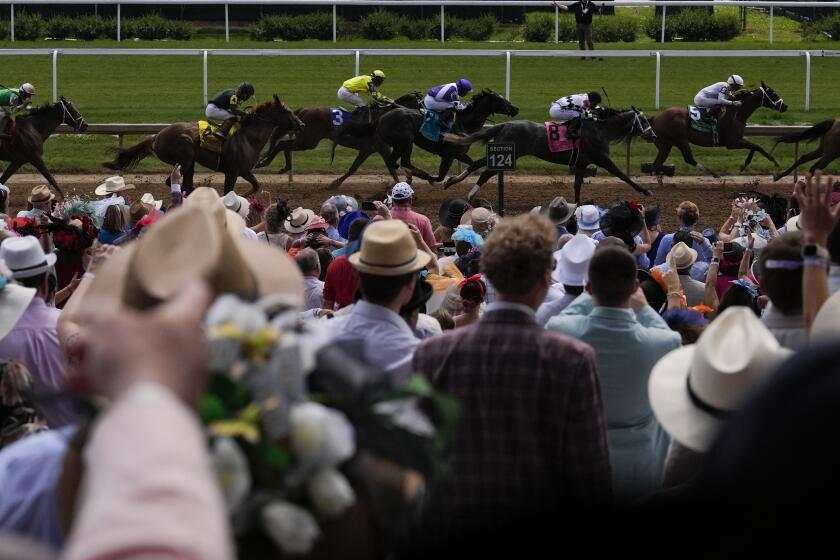The Man They Call ‘The Answer’ Is No Longer a Big Question Mark
- Share via
PHILADELPHIA — Sometimes, you can find someone to admire in strange places.
Allen Iverson has hidden in strange places--in jail when he should have been in high school, under the covers instead of at practice, in a training room closet eating tacos instead of on the training room floor lifting weights.
Iverson is never mentioned as a successor to Michael Jordan. Kobe Bryant, Vince Carter, Tracy McGrady, they are the successors. But Iverson is the young NBA player whose heart and intensity most resemble Jordan’s.
Iverson is never mentioned as one of the NBA’s good guys. Ray Allen, Grant Hill, Tim Duncan and David Robinson are the good guys.
More often, you hear people rooting against Iverson because he has too many tattoos, wears baggy jeans and a skull cap, says “uh” too often and didn’t finish college.
But as you watch the Philadelphia 76ers make their way through the NBA Eastern Conference finals, maybe it’s worth paying closer attention to Iverson.
Ignore the tattoos and watch how hard Iverson plays.
When the 76ers play the Milwaukee Bucks tonight at First Union Center in Game 5, with the series tied 2-2, take time to isolate on Iverson.
Notice how defense matters to him, how he gives away three, four, five inches to everybody he guards and to everybody who is guarding him and how that doesn’t stop him.
Appreciate what he does and understand that his hip and tailbone hurt him so much that he feels like crying when he gets up in the morning.
Remember when you see him put his head down and drive to the basket that he spent much of Tuesday getting his broken tooth fixed and his mouth stitched up. Iverson took an elbow by Allen on Monday, then spent the final two minutes of Philadelphia’s Game 4 victory swallowing blood because he didn’t want the refs to make him sit down.
After the game, if you’re watching the news conferences on TV, you’ll probably see Iverson with his 5-year-old daughter Tiaura or his 2-year-old son Allen II on his lap.
When you see him using a rolled-up towel to play catch with Allen II in the locker room, or coaxing the shy Tiaura onto his lap, you know that this is no absentee father.
For the kids in our society who are looking for guidance, Iverson can teach lessons.
Don’t make snap judgments about him.
He is not close to perfect.
The anti-gay lyrics and disrespectful words about women on a rap album were despicable. As a 25-year-old who has traveled the country and seen so many different people, who has, himself, been spoken of in despicable ways, Iverson should know better. He did apologize, though.
We know how Iverson spent time in prison for a fight at a bowling alley. As a Virginia high school football and basketball star, he was accused of hitting a white male over the head with a chair. There were reports of racial slurs and a massive brawl.
What was said and done to whom probably will never be known, but the governor of Virginia did pardon Iverson.
We know of his run-ins with Philadelphia police. Weapons and marijuana were found in his car. His buddies, his “posse,” were always involved and were sometimes a disruptive force at 76er practices.
Bad, all bad.
But those things aren’t happening now. And for the longest time, that was the only way Iverson knew how to live his life. He was loyal to his street friends, to his mother and to his stepfather, who also has been in prison.
He came to a new world, one where there was more money than he needed and maybe not enough guidance.
And there has been change.
Dikembe Mutombo, a soft-spoken, educated man and the center for Iverson’s team, says that he has never had a better teammate, one who cared more about the game or about winning or about working as hard as possible to help his team win.
“Allen makes us all want to play harder,” Mutombo says.
Aaron McKie, a tough Philadelphia kid whose father died and whose mother abandoned him on the streets, has become Iverson’s mentor.
“I can talk to Aaron about anything and I know I can trust him and listen to him,” Iverson says.
It has taken three years but Iverson has come to appreciate his coach, Larry Brown. Iverson sits next to Brown on the bench during timeouts and listens. He used to curse Brown when the coach took him out. Now Iverson knows Brown takes him out so that he might play another minute, another day, another week.
Iverson, at 6 feet and 160 pounds, is the smallest man to win the NBA’s most-valuable-player award. It is amazing that this wisp can dominate games. It is as much will as skill that carries him.
As many kids as can admire the smooth-talking Jordan, can respect Bryant’s knowledge of Italian and Shaquille O’Neal’s movie making, there are as many who can look at Iverson and see themselves.
They can see a man who has known trouble, who fought authority while desperately searching for guidance, who thought tough words and tough actions were substitutes for being a man, and who has learned, while we all watched and criticized, that manhood doesn’t come easily and that being a winner doesn’t mean only on game night.
It doesn’t always mean earning a college degree. It doesn’t mean never making mistakes. It doesn’t mean that you don’t do bad things while you learn what doing the right thing is.
*
Diane Pucin can be reached at
More to Read
Go beyond the scoreboard
Get the latest on L.A.'s teams in the daily Sports Report newsletter.
You may occasionally receive promotional content from the Los Angeles Times.










